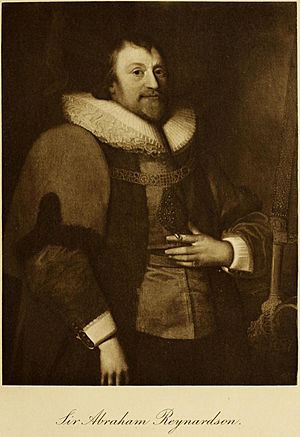Abraham Reynardson facts for kids
Abraham Reynardson (born in 1589 – died on October 4, 1661) was an English merchant. He held an important position as the Lord Mayor of London in 1649.
Contents
Who Was Abraham Reynardson?
Abraham Reynardson was born in Plymouth. His father, Thomas Reynardson, was a merchant who traded with Turkey. Abraham learned the merchant trade in London. He joined the Worshipful Company of Merchant Taylors, which was a group for tailors and cloth merchants. He became a full member of the city on October 5, 1618.
Abraham was also involved with the East India Company. This was a big trading company that brought goods from places like India. He served on their committee and as a Court Assistant for several years.
Abraham Reynardson's Public Life
In 1639, Abraham Reynardson bought a large house in Tottenham. In the same year, he was chosen as Sheriff of London. The Sheriff was an important official who helped keep law and order in the city. He also managed money for the Levant Company, which traded with countries in the Middle East.
Abraham supported King Charles I during a time of great trouble in England. This was before the English Civil War. As the head of the Merchant Taylors' Company, he helped the King ask for money from the city's companies in 1640.
Later in 1640, he became an alderman for the City of London. An alderman was a senior member of the city council. He continued to work with the East India Company. However, he and his colleagues did not want to help Parliament raise money for the war against the King unless they were forced to. In 1648, he became an alderman for a different part of the city.
Becoming Lord Mayor of London
In 1648, Abraham Reynardson was elected the 312th Lord Mayor of London. This was a very important job, like being the mayor of a huge city today. He was the first person from Devonshire to become Lord Mayor.
Soon after becoming Lord Mayor, Abraham had disagreements with the Rump Parliament. This was the part of Parliament that had taken control of England. Parliament had decided that people no longer had to promise loyalty to the King. But Abraham refused to let new members join the city council if they didn't make the old promise of loyalty.
Parliament ordered him to stop taking these promises. They also told him to remove chains that had been put across the streets to protect the city. Abraham did not agree with the trial of King Charles I. He even refused to read the official announcement about the King's trial in public.
Standing Up to Parliament
On January 9, 1649, Abraham Reynardson led a meeting where people discussed a petition. This petition said that Parliament had the highest power in the country. A committee suggested adopting the petition. But when it came up for a vote on January 13, Abraham refused to let the council vote on it. The debate lasted for many hours. Finally, Abraham left the meeting, and the resolution was passed without him.
After King Charles I was executed on January 30, Abraham had a document that showed many important citizens wanted to make a deal with the King. He secretly burned this document. He did this to protect the citizens whose names were on it, as they had shown loyalty to the King.
In March 1649, a copy of the act that ended the King's rule was brought to Abraham's house. He refused to make it public. Because of this, he was called before Parliament. He explained that he couldn't do it because of his beliefs. However, Parliament ordered him to pay a huge fine of £2,000. They also sent him to the Tower of London for two months and removed him from his job as Lord Mayor.
The city council quickly chose a new mayor. Abraham said he lost as much as £20,000 during his time as mayor. When he refused to pay his fine, his belongings were sold. He also resigned from his role at St Bartholomew's Hospital because he was not well. Part of his fine was still unpaid, so in 1651, Parliament ordered that all his property be taken until the fine was paid.
Later Years and Legacy
After the King returned to power in 1660 (this was called the Restoration), Abraham Reynardson and other city council members told the new King, Charles II, about Abraham's actions in 1649. King Charles II honored them. Abraham was knighted by the King on July 5, 1660. This meant he was now called Sir Abraham Reynardson. He was also officially put back in his role as alderman. However, he declined to be Lord Mayor again because he was not well.
Sir Abraham Reynardson passed away in Tottenham in 1661 at the age of 71. His body was displayed at Merchant Taylors' Hall before being buried at St. Martin Outwich church. Later, his remains were moved to a cemetery in Ilford when the church was taken down.
In his will, he left money to help six poor women from his company. He also left silver to be made into special dishes for company feasts. During his life, he had lent a lot of money to the Merchant Taylors' Company. He also gave silver items to his church. He owned land in Essex and Sussex.
Sir Abraham Reynardson was married twice. He had one son who survived from his first marriage. With his second wife, Eleanor Wynne, he had three sons and three daughters, all of whom outlived him.
 | Claudette Colvin |
 | Myrlie Evers-Williams |
 | Alberta Odell Jones |


